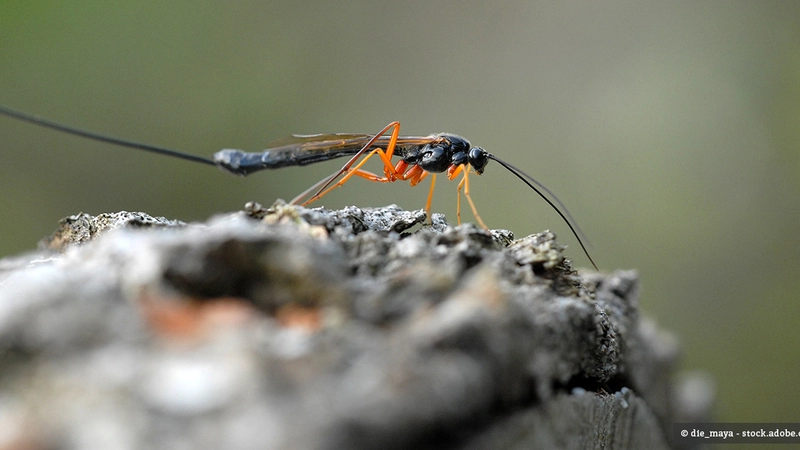Schlupfwespen, also known as parasitic wasps, play a crucial role in nature by controlling pest populations. These tiny yet effective insects help maintain ecological balance and are a boon for both agriculture and home gardens. This comprehensive guide delves into the fascinating world of Schlupfwespen, exploring their lifecycle, benefits, and applications in pest management.
Table of Contents
ToggleUnderstanding Schlupfwespen
Schlupfwespen belongs to the family Ichneumonidae, which comprises thousands of species. These wasps are not the aggressive stingers we often fear; instead, they are specialized parasites that target specific pests. Their primary function is to lay eggs inside or on their hosts, which are usually the larvae of other insects. Once the eggs hatch, the Schlupfwespen larvae consume the host from the inside out, effectively eliminating the pest.
Lifecycle of Schlupfwespen
The lifecycle of Schlupfwespen is a marvel of nature. It begins with the female wasp locating a suitable host. Using her sharp ovipositor, she injects her eggs into the host’s body. The eggs hatch into larvae, which feed on the host’s tissues. This process can take anywhere from a few days to several weeks, depending on the species and environmental conditions. Eventually, the larvae pupate and emerge as adult wasps, ready to continue the cycle.
Types of Schlupfwespen
There are numerous species of Schlupfwespen, each targeting different pests. Some of the most common types include:
- Trichogramma: These tiny wasps are used to control caterpillar populations.
- Aphidius: Known for targeting aphids, these wasps are essential in controlling one of the most common garden pests.
- Encarsia: These wasps are effective against whiteflies, making them valuable in greenhouse environments.
Benefits of Schlupfwespen
The benefits of Schlupfwespen are manifold, particularly in pest management. Here are some key advantages:
Natural Pest Control
Schlupfwespen provides a natural method of pest control that reduces the need for chemical pesticides. By targeting specific pests, these wasps help maintain a healthy ecosystem without harming beneficial insects.
Sustainable Agriculture
In agriculture, Schlupfwespen is invaluable. They help protect crops from destructive pests, leading to higher yields and healthier plants. Farmers can reduce their reliance on chemical treatments, promoting sustainable farming practices.
Eco-Friendly Gardens
For home gardeners, Schlupfwespen offers an eco-friendly solution to pest problems. Introducing these wasps into the garden can help control pests like aphids, caterpillars, and whiteflies, ensuring vibrant and healthy plants.
Applications in Pest Management
The use of Schlupfwespen in integrated pest management (IPM) has gained popularity due to its effectiveness and environmental benefits. IPM combines biological control methods with traditional pest control techniques to create a comprehensive approach.
Agricultural Use
Farmers can introduce Schlupfwespen into their fields to manage pest populations naturally. This method is particularly effective in organic farming, where chemical pesticides are limited. Schlupfwespen helps protect crops such as tomatoes, cucumbers, and peppers from common pests.
Greenhouses
In greenhouse environments, Schlupfwespen is essential for controlling pests that thrive in these closed systems. By releasing these wasps, growers can keep pest populations in check, ensuring healthy and productive plants.
Home Gardens
Home gardeners can purchase Schlupfwespen for their gardens to manage pests naturally. These wasps are particularly useful for controlling aphids, caterpillars, and other common garden pests. Regularly introducing Schlupfwespen can maintain a balanced garden ecosystem.
How to Introduce Schlupfwespen
Introducing Schlupfwespen into your garden or farm requires careful planning and monitoring. Here are some steps to ensure success:
Identify the Target Pest
Determine which pests are causing problems in your garden or field. Different species of Schlupfwespen target different pests, so it’s crucial to identify the pests accurately.
Purchase from Reputable Sources
Buy Schlupfwespen from reputable suppliers who specialize in biological control agents. Ensure that the wasps are healthy and ready for release.
Release at the Right Time
Release the Schlupfwespen during the early morning or late evening when temperatures are cooler. This timing helps the wasps acclimate to their new environment and increases their chances of survival.
Monitor and Adjust
Regularly monitor pest populations and the activity of the Schlupfwespen. If necessary, release additional wasps to maintain control.
Conclusion
Schlupfwespen are nature’s tiny yet mighty pest controllers. Their ability to target and eliminate specific pests makes them invaluable in both agriculture and home gardening. By integrating Schlupfwespen into pest management strategies, we can reduce reliance on chemical pesticides, promote sustainable practices, and maintain a healthy ecosystem. Whether you’re a farmer, gardener, or simply interested in natural pest control, Schlupfwespen offers an effective and eco-friendly solution. Embrace these remarkable insects and discover the benefits they bring to your plants and crops. If you have any questions, please visit the Kaz World Mag.
Frequently Asked Questions about Schlupfwespen
What are Schlupfwespen?
Schlupfwespen, or parasitic wasps, are a type of wasp that lays its eggs inside or on other insects. The larvae feed on the host insect, eventually killing it. They are valuable for natural pest control.
How does Schlupfwespen help in pest control?
Schlupfwespen target specific pests, such as caterpillars, aphids, and whiteflies. By parasitizing these pests, they help control their populations without the need for chemical pesticides.
Are Schlupfwespen harmful to humans?
No, Schlupfwespen is not harmful to humans. They do not sting or bite and are solely focused on finding and parasitizing their insect hosts.
Can I use Schlupfwespen in my home garden?
Yes, Schlupfwespen can be used in home gardens to control pest populations naturally. They are particularly effective against aphids, caterpillars, and whiteflies.
How do I introduce Schlupfwespen into my garden?
To introduce Schlupfwespen into your garden, purchase them from a reputable supplier. Release them during cooler parts of the day, and monitor their activity to ensure they are effectively controlling pests.
How long do Schlupfwespen live?
The lifespan of Schlupfwespen varies by species and environmental conditions. Generally, adult wasps live for a few weeks to a few months, depending on the availability of hosts and other factors.
Does Schlupfwespen target all types of pests?
No, different species of Schlupfwespen target specific pests. For example, Trichogramma wasps target caterpillars, while Aphidius wasps target aphids. It’s important to identify the pest you want to control and choose the appropriate species of Schlupfwespen.
Can Schlupfwespen be used in greenhouses?
Yes, Schlupfwespen is particularly useful in greenhouse environments, where they can help control pests that thrive in these closed systems, such as whiteflies and aphids.
Where can I buy Schlupfwespen?
You can purchase Schlupfwespen from specialized suppliers of biological control agents. Many online retailers and agricultural supply stores offer these beneficial insects.
How many Schlupfwespen do I need for my garden?
The number of Schlupfwespen needed depends on the size of your garden and the severity of the pest infestation. Suppliers often provide guidelines on the appropriate quantity based on these factors.
Do I need to reintroduce Schlupfwespen regularly?
Depending on the pest pressure and environmental conditions, you might need to reintroduce Schlupfwespen periodically to maintain effective pest control. Monitoring pest populations will help you determine when additional releases are necessary.
Are there any plants that attract Schlupfwespen naturally?
Yes, certain plants can attract Schlupfwespen by providing nectar and pollen. Plants such as dill, fennel, and yarrow are known to attract these beneficial wasps and can be planted to support their populations.
How do Schlupfwespen find their hosts?
Schlupfwespen locates their hosts using a combination of visual and chemical cues. They can detect the presence of host insects through their movements, smells, and even the vibrations they produce.
Can Schlupfwespens survive winter?
Many species of Schlupfwespen can survive winter by entering a state of dormancy. Some species overwinter as larvae inside their hosts, while others may find shelter in plant debris or soil.
What should I do if I don’t see immediate results after releasing Schlupfwespen?
It’s important to be patient after releasing Schlupfwespen. It may take some time for the wasps to locate and parasitize the pests. Regular monitoring and ensuring that the environment is conducive to their survival will help in achieving effective pest control.

